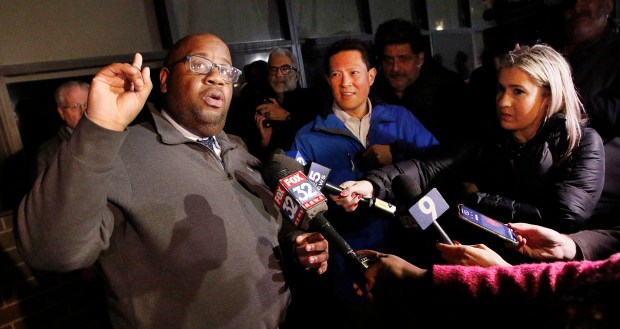A crowd of around 100 region residents and environmental advocates left East Chicago Central High School frustrated and angry Thursday night after a scheduled public hearing on BP Whiting refinery’s air permit was canceled at the last minute.
The meeting was organized by the Indiana Department of Environmental Management, who blamed the cancellation on a decision by East Chicago’s interim school superintendent Marlon Mitchell to bar news media from the building, while officials from the School City of East Chicago offered a different account, making no mention of news media in a statement released Friday afternoon.
The school district instead attributed the cancellation to a failure by IDEM to provide adequate security for the event.
“Approximately one hour prior to the scheduled start of the public meeting, SCEC leadership attempted to determine whether or not IDEM had arranged for sufficient security to manage the number of attendees who were already present outside the building,” the statement read. “Approximately one-half hour prior to the scheduled start of the meeting, IDEM advised that it would only be able to assure the presence of ‘roving’ officers of the East Chicago Police Department, who would not be dedicated to providing security at the meeting location.”
At 6 p.m., when the meeting was due to start, members of the crowd began loudly knocking on the school’s doors and chanting “let us in,” conduct that the SCEC characterized as an attempt at “forced entry.”
Several minutes later, IDEM communications director Allen Carter emerged from the school building and addressed reporters and attendees, explaining that the meeting had been canceled at the behest of Mitchell.
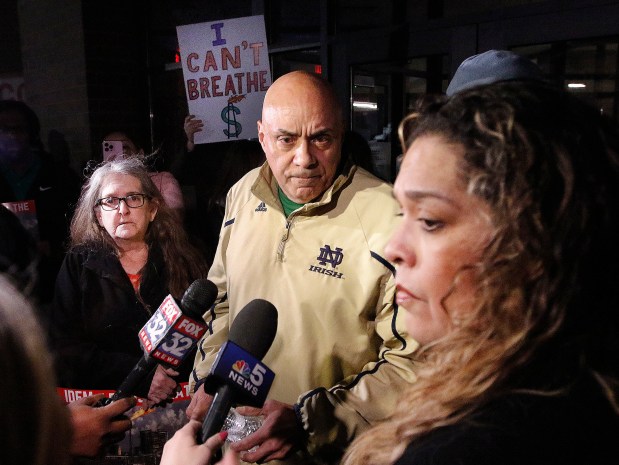
“We came here with the intention of holding a public meeting. That included with members of the media,” Carter said. “The school made the decision that they were uncomfortable with that and decided that they wanted to terminate the meeting.”
Carter’s announcement was met with shouts of frustration from the crowd. He stressed that his agency was not responsible for the decision, and referred further questions about the cancellation to the school district.
In its statement, the SCEC wrote that the meeting was canceled “due to the failure of IDEM to obtain an appropriate security commitment and the unruly behavior of some members of the public who had gathered for the meeting.”
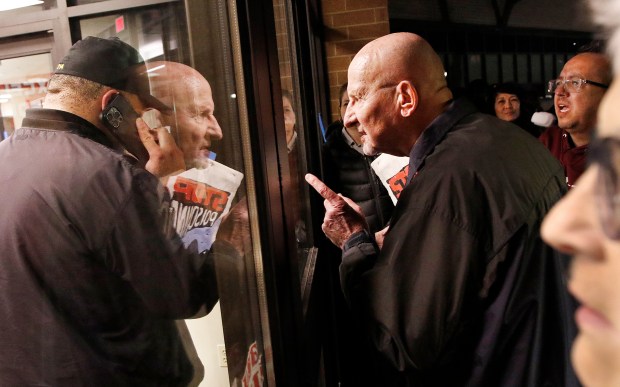
“We’re looking at an alternative time to host another meeting,” Carter said. “Right now, we don’t know when that’ll be yet though. We are certain that we want to hold this meeting in public.”
BP’s application to renew its five-year IDEM-issued air permit drew widespread public attention following a string of environmental incidents at the sprawling petroleum facility, the footprint of which extends from Hammond through Whiting into East Chicago.
In January, the refinery experienced two separate tank leaks, one on Jan. 18 and another on Jan. 23, caused by equipment failures. The leaks resulted in a release of benzene and hydrogen sulfide into the atmosphere, IDEM said, and spread a strong chemical odor across the region and into nearby communities in Illinois.
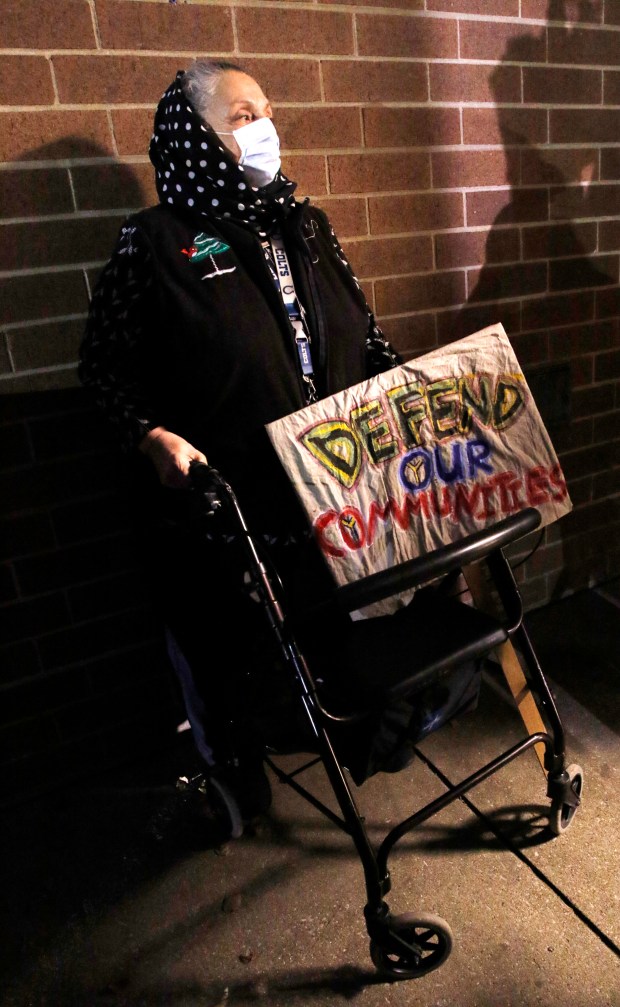
On Feb. 2, the facility was evacuated and temporarily shut down following a power failure that led to unplanned gas flaring and the precautionary closure of nearby roads by local law enforcement. Power was restored and operations resumed the following day, according to the company, and no injuries were reported.
In the wake of the tank leaks and following the power failure, nearby residents took to social media to complain about the acrid odor to attribute an array of negative health effects, including headaches, dizziness, and eye irritation, to the refinery.
Lourdes Hicks, who lives close to the refinery in East Chicago’s Marktown Historic District, showed up at the school after she and several of her neighbors experienced nausea and other symptoms that she blames on BP’s facility.
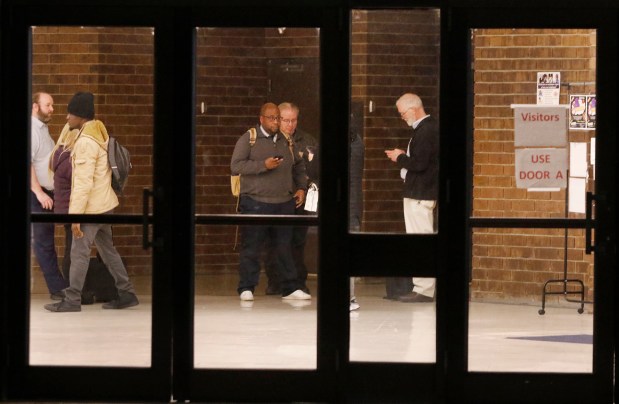
“The smell was almost an instant headache,” she told the Post-Tribune, and added that she “absolutely” plans to attend the rescheduled meeting.
“And I plan on asking the neighborhood to come out and speak as well, because you know what? This is not acceptable,” she said.
SCEC board trustee Jesse Gomez, who serves as the board’s secretary, told the Post-Tribune that he was “personally very disturbed” by Mitchell’s decision to cancel the IDEM meeting. At the time of the meeting, Mitchell and the board were holding a work session at the school district’s administration building on East 144th Street.
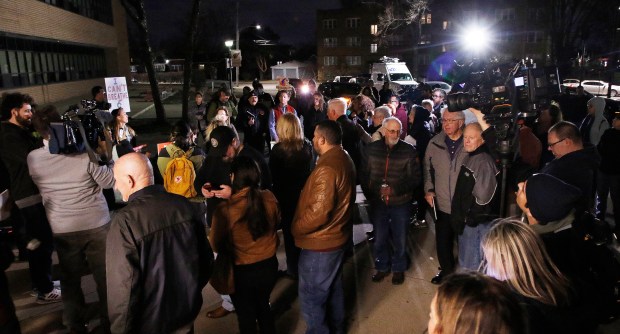
Gomez said that Mitchell characterized the behavior of the crowd to the board as concerningly aggressive and voiced opposition to allowing news media to bring cameras inside the high school. After reviewing video of the event, Gomez said, he found the superintendent’s concerns unfounded.
“The people that I saw that video, I know these people, they live in the neighborhood,” he said. “I cannot see why you would deny the media the opportunity to be there.”
The school district’s policies, Gomez said, do not bar cameras, microphones, or news media from public events held in school buildings. Public permitting meetings held by IDEM are typically open to reporters and are held without restrictions on photography, videography, and audio recording.
“I think it’s problematic on many ends,” Gomez said. “And so I hope that my colleagues would feel the same way I do, that a full investigation needs to be made, and any discipline that needs to happen, needs to happen.”
John Bakota, 80, is a lifelong East Chicago resident. He showed up to Thursday’s meeting, he said, to demand more accountability from BP.
“You get up in the morning and there’s an odor of oil in the air and you don’t know what the product is that’s in there,” he told the Post-Tribune. “We live in an industrial city. We should be able to have some control on air quality.”
The Environmental Law and Policy Center, a Midwest-based environmental advocacy nonprofit, has led a push for more stringent environmental requirements to be added to BP’s permit. Rob Michaels, a managing attorney at the organization, told the Post-Tribune that the Feb 2 flaring incident is a sign that the facility needs additional oversight. He called the facility’s draft permit “woefully incomplete.”
“There are numerous vital documents, including an emergency response plan, preventative maintenance plan, a leak detection plan, that needed to be included with this permit. They’re not there. We don’t know if these documents exist, let alone what they say, whether they’re adequate under the law to ensure adequate monitoring,” he said. “We’re not trying to shut the refinery down in any way but it’s the largest refinery that BP has, it ought to operate safely, it ought to operate lawfully.”
A BP spokesperson did not return a request for comment on Friday.
Much of the conflict between environmental advocates and IDEM over permitting is rooted in the department’s stance on what the U.S. Environmental Protection Agency calls “environmental justice”— the principle all people, regardless of race, income and other demographic factors, should be equally protected from adverse environmental effects and should be meaningfully involved in regulatory decisions that will impact their local environment.
Northwest Indiana’s industrial areas, which have long faced an outsized environmental impact from industrial pollution and are home to a disproportionate number of Hoosiers of color, advocates say, deserve special consideration from state environmental regulators.
IDEM maintains that though it takes steps to include members of the public in permitting and other agency actions, it lacks statutory guidance on how to weigh environmental justice concerns.
“To date, there are no federal or state rules or laws governing environmental justice as it relates to permitting decisions,” an IDEM spokesperson wrote in a statement to the Post-Tribune. “While public participation is a vital component of the administrative permitting process, IDEM’s permitting decisions ultimately must be made in accordance with applicable laws and regulations.”
Thomas Frank, an East Chicago resident and co-founder of the grassroots Community Strategy Group and Calumet Lives Matter, told the Post-Tribune that IDEM’s approach to permitting compounds existing environmental and health problems stemming from industrial polluters in the region. That Northwest Indiana is home to numerous significant sources of air pollution, including steel mills and related industries, should compel the department to take a stricter approach to permitting with BP and its peers.
“We consider IDEM as an arm of economic development in the state of Indiana, not there to protect the health and welfare of the community. If they did, they would consider the aggregate impacts on the community, which they don’t,” he said. “We’re really concerned. We may be seeking to ask another entity to manage this permitting process, like Region 5 EPA because we lack confidence in IDEM at this point.”
The deadline for members of the public to file written comments on BP’s permit renewal application was originally set to elapse on Monday, but IDEM now plans to extend it to coincide with the rescheduled public meeting, the agency said in a statement on Friday.
The date, time and location of the meeting will be announced by IDEM “at a later date.” In its statement, the School City of East Chicago wrote that the district would be willing to host the rescheduled meeting “with arrangements for an appropriate security commitment.”


